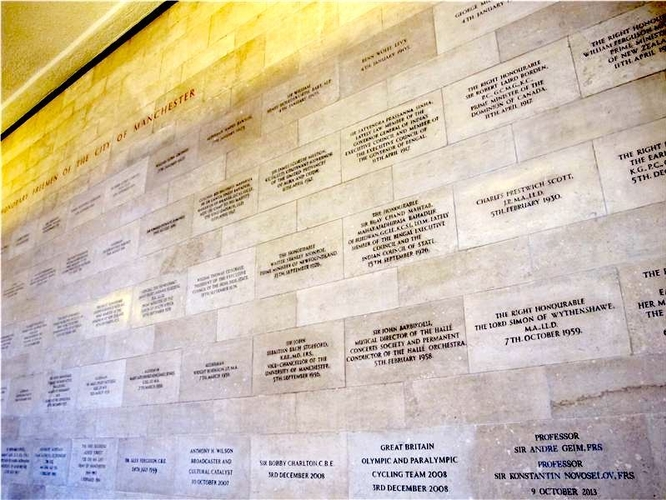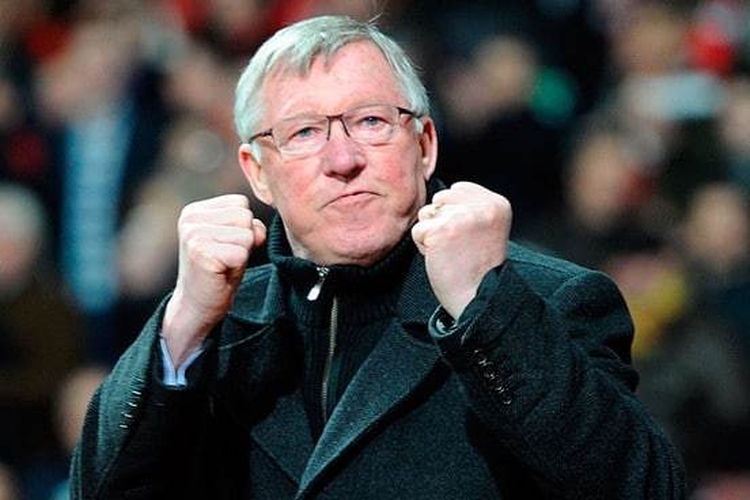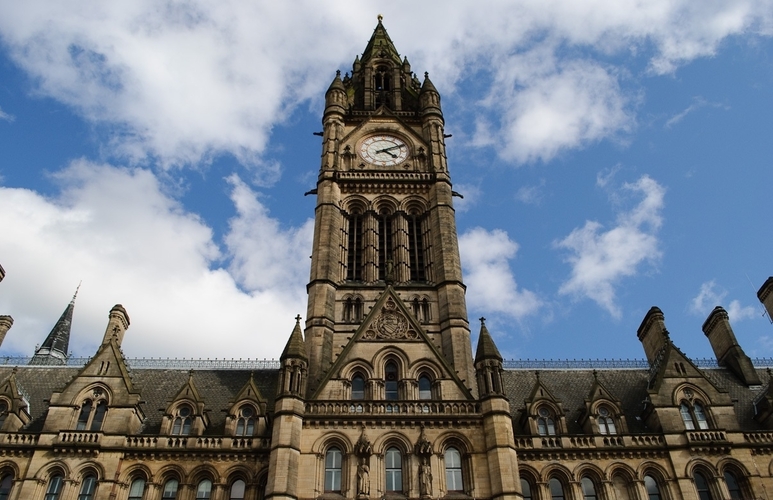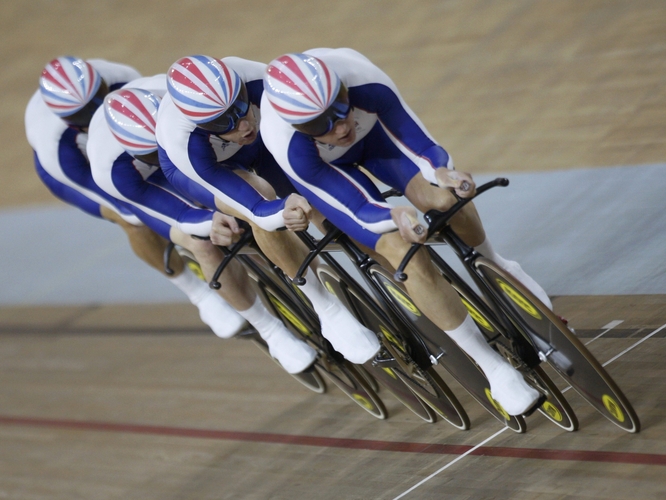From Winston Churchill to Sir Alex Ferguson - here's a comprehensive list of all recipients of the city’s highest honour
Following calls and a petition (which has gained over 14,000 supporters) for American pop star Ariana Grande to be granted 'Freedom of the City of Manchester' following her One Love Manchester benefit concert on Sunday, we take a look back at all those who have been granted the honour - from Winston Churchill and Kathleen Ollerenshaw to Alex Ferguson.
First published in August 2014
Becoming an Honorary Freeman of Manchester is the highest honour the city can bestow. Not that it has any practical application anymore. Traditionally, freeman enjoyed special privileges, they could travel across the country exempt from tolls and held the right to vote in parliamentary elections. Now, it’s a purely symbolic honour. A huge pat on the back. You can no longer, for example, lance a Yorkshireman in Oldham, or even park in the city centre for free on a Sunday.
In 2013 it was announced that the two University of Manchester boffins behind the isolation of graphene (the world’s new ‘miracle material’), Sir Andre Geim and Sir Kostya Novoselov, were to be awarded the Freedom of the City at a Town Hall ceremony. The Russian-born pair were only the fifth such individuals or groups to receive the honour in over quarter of a century.
This got us thinking. When was the Freedom of the City first handed out in Manchester? And how many have received this honour? There’s a whole wall dedicated to the ‘Honorary Freemen of the City of Manchester’ in the Council Chamber Anteroom in the Town Hall extension.
The list, dating from 1888, contains 79 individuals including: Prime Ministers, Presidents, Governors, Commanders, Reverends, Earls, Dames, Lords, Ladies, Sirs, Nellies, doctors, engineers, philanthropists, scientists, football manager, musicians, one cycling team, seven military regiments and the Maharaja of Burdwan - wherever that is. Oh and a Barry (we know because we went to the Chamber wall and counted).
Here are all the recipients:
Oliver Heywood, 1888: The first Honorary Freeman of Manchester, Heywood was a local banker who gave over much of his money and time to charities and educational institutions such as Chetham’s Hospital. His statue (1894) stands proudly in Albert Square facing the Town Hall entrance.
Henry Morton Stanley, 1890: A Welsh-born American journalist and African explorer famous for his search for Dr Livingstone and the part he played in the opening up of the Congo.
Alderman Abel Heywood, 1891: Born in Prestwich, Heywood was a radical, an active Chartist who regularly fell foul of the law for selling reformist literature. He became Lord Mayor in 1862 working to alleviate the harm caused by the Cotton Famine. The Town Hall’s clock bell, Great Abel, is named after Alderman Heywood.
Thomas Ashton, 1892: A cotton manufacturer and philanthropist born in Hyde. A Liberal, Unitarian and social reformist, Ashton inherited his father’s cotton mill and enlarged the mill school, built a church at Flowery Fields and expanded the village built by his father. During the cotton famine when many mills were closing, Ashton kept his mills and workers going.
James Jardine, 1892: Cotton manufacturer and Chairman of the Manchester Royal Exchange, Jardine donated a new wing to Ancoats Hospital.
Dr. Adolphus William Ward, 1897: Professor of History and English at Owens College (now the University of Manchester) and its principal from 1890 to 1897. No staff member played a more pivotal role in raising the academic status of the University.
Herbert Philips, 1897: Extensive philanthropist, justice of the peace, temperance and clean air campaigner.
Mrs Enriqueta Austina Rylands, 1899: Enriqueta devoted twenty years and some two million pounds, inherited from her textile magnate husband, to build the John Rylands Library. She was a great philanthropist and admired for her kindness, determination and intellect.
Robert Dukinfield Darbishire, 1899: A career lawyer and founding father of Manchester Museum.
Richard Copley Christie, 1899: Law professor, historian and bibliophile. Richard and his wife Mary were instrumental in the foundation of the cancer centre that still bears their name, The Christie Foundation.
Sir William John Crossley, 1903: Engineer, Liberal MP for Altrincham and founding director of Manchester Ship Canal. In 1905 Sir William personally funded the Crossley Tuberculosis Sanatorium in Cheshire.
Alderman Harry Rawson, 1903: Councillor Rawson, printer, bookseller and closely involved in the development of Manchester’s Mechanics Institute.
Sir William Henry Houldsworth, 1905: Industrialist and Conservative MP for Manchester North West from 1883 to 1906. In 1863, Houldsworth began building Reddish Mill, at that time the largest cotton-spinning mill in the world.
Benn Wolfe Levy, 1905: Founder of the David Lewis Trust.
George Milner, 1905: Founder and President of the Manchester Literary Club, he was ‘identified with what is best and most cultured in the city of Manchester’.
Alderman James Wilson Southern, 1906: Member of Manchester Council for over a quarter of a century and dedicated municipal leader.
Sir Wilfred Laurier, 1907: Prime Minister of Canada.
Alfred Deakin, 1907: Prime Minister of Australia.
Sir Joseph George Ward, 1907: Prime Minster of New Zealand.

Leander Starr Jameson, 1907: Prime Minster of the Cape Colony.
Sir Robert Bond, 1907: Prime Minster of Newfoundland.
Frederick Robert Moor, 1907: Prime Minister of Natal.
Louis Botha, 1907: Prime Minister of Transvaal.
Sir Thomas Vansittart Bowater, 1914: Manchester-born Lord Mayor of London.
William Morris Hughes, 1916: Prime Minister of Australia.
Alderman Sir Edward Holt, 1916: Brewery owner and Lord Mayor of Manchester.
Sir Edward Donner Beronet, 1916: Chairman of the Manchester and Liverpool District Banking Society and founding member of the Manchester High School for Girls. In his later years Donner was known as ‘The Great Old Man Of Manchester’.
Maharaja Sir Ganga Singh Bahadur, 1917: Progressive Indian Ruler and General. Singh was the Maharaja of Bikaner and the only ‘non-white’ member of the British war cabinet during WW1.
Sir James Scorgie Meston, 1917: Governor of the Agra and Oudh.
Sir Satyendra Prasanna Sinha, 1917: Governor General of India
Sir Robert Laird Borden, 1917: Prime Minister of Canada.
William Ferguson Massey, 1917: Prime Minister of New Zealand.
Lt. Gen. Jan Christiaan Smuts, 1917: Representative of South Africa
Sir Edward Patrick Morris, 1917: Prime Minister of Newfoundland.
Prime Minister David Lloyd George, 1918: Manchester-born but raised in Wales, George was a bright spark, becoming a Liberal MP aged just 27. He went on to become one of Britain’s great reformist chancellors and a wartime Prime Minister from 1916 to 1922. He once famously said of the House of Lords: "a body of five hundred men chosen at random from amongst the unemployed.”
President Woodrow Wilson, 1918: The 28th President of the United States, Wilson visited Manchester and gave a speech in the city at the Free Trade Hall on Peter Street (now the Radisson Blu Edwardian hotel), he said: “I take it that I am not far from right in supposing that that is the reason why Manchester has been a centre of the great forward-looking sentiments of men who had the instinct of large planning, not merely for the city itself, but for the Kingdom and the Empire, and the world".
Admiral Sir David Beatty, 1919: The youngest Admiral since Horatio Nelson, Beatty was a charismatic and courageous leader who fought in First World War sea battles.
Sir Douglas Haig, 1919: Commander on the Western Front for most of World War One.
Marshal Ferdinand Foch, 1923: Marshal of France and Commander of the Allied Armies during the First World War’s closing months.
William Lyon Mackenzie King, 1926: Prime Minister of Canada.
Stanley Melbourne Bruce, 1926: Prime Minister of Australia.
Joseph Gordon Coates, 1926: Prime Minister of New Zealand.
James Barry Munnik Hertzog, 1926: Prime Minister of South Africa.
William Thomas Cosgrave, 1926: First Prime Minister of the Irish Free State.
Walter Stanley Monroe, 1926: Prime Minster of Newfoundland.
Maharaja Bijay Chand Mahtab, 1926: Maharaja Adhiraja Bahadur of Burdwan.
Charles Prestwich Scott, 1930: Long standing editor and later owner of the Manchester Guardian. Scott, born in Bath, joined the paper during his second year at Oxford University and was editor of The Guardian in under a year aged - just 25. Under his lead, the paper went on to national prominence. He could regularly be seen cycling from his home in Fallowfield to the office on Cross Street.
The Earl of Derby, 1934: Governor of Victoria University of Manchester and President of Manchester Royal Infirmary.
Alderman Hermann Julius Goldschmidt, 1937: Councillor, Governor of Victoria University of Manchester and Royal Eye Hospital, Member of the Finance and Libraries Committees and the Galleries Committee.
Alderman William Turner Jackson, 1937: Council member for over 30 years and Lord Mayor of Manchester between 1923-24, Turner Jackson was a champion of public health concerns and fought for the establishment of the Wythenshaw Estate in the 1930s.
Prime Minster Winston Spencer Churchill, 1943: (main image) Considered by many to be the greatest ever Briton, Churchill helped lead Britain to victory against the Nazis in the Second World War. He served as MP for Oldham from 1900 to 1906, MP for Manchester North West from 1906 to 1908 and as Prime Minster twice from 1940 to 1945 and 1951 to 1955. As a schoolboy, Churchill’s first headmaster said that the "boy lacked ambition" (see video here).
Sir Bernard Law Montgomery, 1945: Commander of the British Army during the Second World War. His victory at El Alamein turned the tide of the war.

Sir Arthur William Tedder, 1945: Marshall of Royal Air Force and deputy commander of the Allied Expeditionary Force under General Dwight D. Eisenhower, Tedder contributed heavily to defeat of the Germans in North Africa and the Allied invasions in Sicily, Italy and Normandy.
Lord Cunningham of Hyndhope, 1945: Admiral of the Fleet and Britain’s most famous admiral during the Second World War.
Sir Harold R.L.G. Alexander, 1945: Field Marshal Alexander directed the retreats at Dunkirk and in Burma and the conquest of Sicily and bitter battle in Italy. He later became Minister of Defence under Churchilll.
The Manchester Regiment, 1946
Alderman Sir William Kay, 1949: Long-serving member of the Council and tireless committee member, Kay served on over 50 committees during a distinguished municipal career.
Clement Richard Attlee, 1953: Leader of the Labour party for two decades from 1935 to 1955. Attlee served as the post-war Prime Minster from 1945 to 1951. Attlee presided over the most significant reforming government of the twentieth century, introducing the NHS, nationalised one fifth of the British economy and saw over the decolonisation of India, Pakistan, Burma, Ceylon and Jordan.

Alderman Sir Miles Ewart Mitchell, 1954: Former Lord Mayor of Manchester.
Alderman Mary Latchford Kingsmill Jones, 1956: The first female Lord Mayor of Manchester, Jones served as a Governor of Manchester Grammar, Manchester High School for Girls, John Rylands Library and the University of Manchester and a President of the Red Cross Society, amongst others.
Alderman Wright Robinson, 1956: Former Lord Mayor of Manchester and career Council committee member and Governor.
Sir John Sebastian Bach Stopford, 1956: Professor of Anatomy at Manchester University in 1919, aged just 31, and was Vice-Chancellor of the University from 1934 until 1956. He held many positions on professional bodies in the field of health care, becoming a Fellow of the Royal Society in 1924. He was once described as ‘one of the greatest anatomists of the century’.
The 613 Manchester Royal Auxiliary Air force, 1957
Sir John Barbirolli, 1958: A conductor of the Halle Orchestra for 27 years, Barbirolli resurrected the orchestra after the war and made it into a household name. You can see busts of Barbirolli both outside the Bridgewater Hall and in the Sculpture Hall of the Town Hall.

Lord Ernest Simon of Wythenshawe, 1959: Former Lord Mayor (the youngest to have held the office at that time) and twice Liberal Withington MP, he is remembered mainly for his clearances of the slums and housing projects in Manchester. He purchased Wythenshawe Hall and Park and gave it as a gift to the city for use of the people living in Wythenshawe.
Edward John, Earl of Derby, 1961: Her Majesty’s Lieutenant of the County Palatine of Lancaster, Edward John, the eighteenth Earl of Derby was awarded the Military Cross for service in the Second World War.
The King’s Regiment (Manchester & Liverpool), 1962
Lady Shena Simon of Wythenshawe, 1964: Politician and educational reformer, she founded the Women Citizens Association in Manchester. Along with husband, Ernest Simon (above), they gave to the city Wythenshawe Hall and Park and she devoted much time into Wythenshawe housing estate.
The First Grenadier Regiment of Foot Guards, 1964
Sir Matthew Busby CBE, 1967: Unrivalled at Manchester United until Alex Ferguson came along, Busby managed the club between 1945 to 1969 and for a much shorter stint between 1970 and 1971. Along with his ‘babes’, Busby lifted five league titles, two FA trophies and a European Cup. After the Munich air disaster of 1958, Sir Matt fought back to health and rebuilt his side.
Alderman Thomas Francis Regan, 1973: Municipal figure
Alderman Sir Richard Stephenson Harper, 1973: Municipal figure
Alderman Sir Robert Thomas, 1973: Municipal figure
Alderman Dame Elizabeth Yarwood, 1974: Former Lord Mayor and Justice of the Peace, Yarwood served in local government for over thirty five years.
Honorary Alderman Mrs. Nellie Beer, 1974: Long-serving council member, Lord Mayor and Justice of the Peace, Nellie also possesses the best and most northerly name on this list.
Sir Bernard Lovell, 1977: Professor of Radio Astronomy at the University of Manchester, founder and first Director of The University of Manchester’s Jodrell Bank Observatory in Cheshire (the largest in the world when completed in 1957). During the Second World War Lovell led the team that developed H2S radar.
Honorary Alderman Dame Kathleen Ollerenshaw, 1984: Despite being nearly completely deaf since the age of eight, Manchester-born Ollerenshaw became a lecturer at Manchester University, an advisor to Thatcher’s government on education and eventually Lord Mayor of Manchester. She is best known as a hugely gifted mathematician and astronomer, at age 85 she published work that solved the long-standing problem with magic squares.
Reverend Alfred Jowett, 1984: An unconventional Dean of Manchester from 1964 to 1983, Jowett once described himself as a "manuscript preacher". While some complained of Jowett as too secular, he threw himself into city life and brought the city back to the church through charisma, intellectual engagement and both community and international relations.
Her Majesty’s Ship Manchester, 1998.
Sir Alex Ferguson CBE, 1999: The most successful football manager Britain has ever seen, Ferguson won 49 titles in a career spanning nearly four decades: one with St Mirren, ten with Aberdeen and 38 titles in 26 years with Manchester United. A battle-hardened, fiery-tempered and working-class Scot, few have dared to cross Fergie and those that did have come to regret it. The treble of 1999 was Fergie’s crowning glory.
The Duke of Lancaster’s Regiment, 2006
Anthony H Wilson, 2007: Salford-born broadcaster, journalist, entrepreneur, music mogul, ‘cultural catalyst’, founder of Factory Records and the Hacienda. Author and broadcaster Stuart Maconie said: "There was no more influential and important figure in music in the last 30 or 40 years.”
Sir Bobby Charlton CBE, 2008: One of Busby’s ‘babes’, made 754 appearances and scored 247 goals for the club. Charlton captained the club for six years between 1967 and 1973, led the club to its first European cup and survived the tragic Munich air disaster which killed eight United players. He was also an integral part of the 1966 England World Cup winning team and named European footballer of the year in the same year. Charlton remains to this day a United Director and ambassador of the club.
Great Britain Olympic and Paralympic Cycling Team, 2008: The 37-strong team, based at Manchester’s Velodrome, picked up fourteen Olympic and twenty Paralympic medals during the Beijing games of 2008.
207 Manchester Field Hospital Volunteers, 2011
Professor Sir Andre Geim and Professor Sir Konstantin Novoselov, 2013: Russian-born Professors Sir Andre Geim and Sir Kostya Novoselov, isolated graphene, the world’s new ‘wonder material’, for the first time at the University of Manchester in 2004. They were awarded the Nobel Prize in Physics in 2010 and were subsequently knighted in 2012 for services to science
Phew. So there you have it, every single recipient of the Freedom of Manchester award. If you’re reading this then congratulations, you’re one of three people to reach the bottom of the list without dying first.
If you have the energy, or any remaining eye function, then Salford also has a list of 23 Honorary Freemen including LS Lowry, Nelson Mandela and Ryan Giggs (see here).
Follow @David8Blake on twitter





















